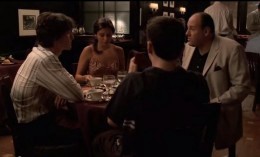The Decline And Fall Of The Family Business

Would you go into business with your parents, or follow their footsteps into a career? Did you? It’s easy to romanticize the “family business.” Consider this essay about the oldest Japanese hot bath spa, or onsen:
At the time this onsen opened, it was the Western Middle Ages; before Charlemagne; before the Islamic Conquest of Spain; it was 1000 years before the Declaration of Independence of the United States of America.
At the time the onsen opened, my country of birth, New Zealand, had not yet been discovered by our Maori ancestors.
And in all that time, it has been operated by the same family. The same family operating the same onsen for over 1,300 years.
It is currently in its 52nd generation of continuous management. Some of the staff are from families who’ve held the same post for generations, passing it from parent to child, child to grandchild, grandchild to great grandchild.
That is an extreme example, of course. But the author argues that, though we pay lip service these days to admiring that kind of continuity, our actual values are much more in line with entrepreneurship: getting ours and then getting out.
She writes:
to be an entrepreneur, one must have an exit strategy. To focus on it as their end goal. Encouraged by investors to build towards the big pay out — even if that means abandoning their customers, who helped them achieve that which made them attractive to the investor in the first place. The acquirer may then shut the business down, or more commonly, shift focus and neglect that je ne sais quoi, oh so very special, that made the company and service what it was. …
I imagine [the owners of the onsen] focused, not on an exit strategy, but on an exist strategy, a strategy built on sticking around; a strategy not for a buy-out, but for a handing down, a passing along.
I wonder what decisions we would make differently if we inherited the work we do?
I wonder what decisions we would make differently if our duty was to pass on the work we do? …
What if, instead of focusing on exits, we focused on sticking around?
What if the focus wasn’t on selling up and moving on, but instead was on handing down and passing on?
This is a nice idea. But I’m awfully grateful that I wasn’t expected to take on my parents’ work. They’re both lawyers and were both unhappy for significant parts of their careers; I have no doubt that I too would be less than satisfied as Ester, Esq. I’m much more excited to be Ester Who Is About To Start Recapping “Outlander” For Vulture. Will I pass on that to Babygirl? Not if I can help it. I want her to be an engineer, not a freelancer.
Besides, I recapped HBO’s show about one of America’s most durable dynasties, the Durst family, and I wasn’t exactly inspired. Robert Durst, now under arrest for a slew of crimes, is the eldest son and heir of a mega-business that goes back a century. When his younger brother Douglas was chosen over him to be pater familias, Robert broke with the rest of the Dursts and threatened Douglas to a degree that Douglas feared for his life. There were fault lines even before that: Robert’s mother committed suicide when he was a boy and, horrifyingly, he was held by his father at a window to watch.
And let’s not even talk about “The Sopranos.”
Siblings jostling for favor, children feuding with parents … no, family businesses are not reliable bastions of family values. That is why we did away with the monarchy, isn’t it? Because we realized that genetics are not determinative, that often the best person for a position is not the person born to it but the person passionate about it. Also because we decided that a “self-perpetuating autocracy” that exploits the working class isn’t super defensible these days.
It is an intriguing idea, nonetheless, to treat your job the way you would if you were to hand it down to your children. Not sure what I’d do differently. Maybe change from a robe into real clothes earlier in the day?
Support The Billfold
The Billfold continues to exist thanks to support from our readers. Help us continue to do our work by making a monthly pledge on Patreon or a one-time-only contribution through PayPal.
Comments